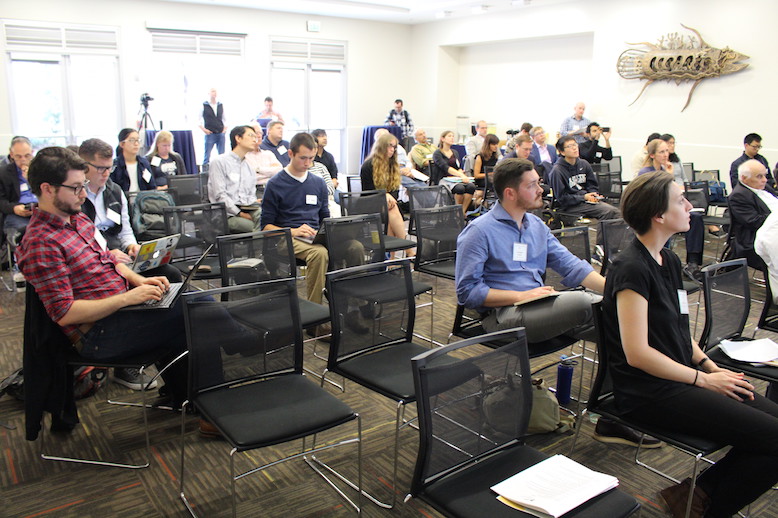What are the latest advances in encryption? How should cybersecurity be built into urban infrastructure? What measures can be taken to secure the internet of things for senior users? How might custom-fit, brainwave-detecting earbuds be used for authentication?
These were just a few of the topics discussed at the 2nd annual CLTC Research Exchange, a one-day conference held on September 28 at the David Brower Center, in Berkeley. Approximately 60 scholars and community partners attended the conference, where CLTC grantees from 2017 and 2018 presented concise summaries of their research projects.

“We think of the Research Exchange as a celebration of the world-class, multi-disciplinary research in cybersecurity that’s going on across campus,” said Ann Cleaveland, CLTC’s Executive Director, in her opening remarks. “We have a really good mix of people in the audience today. We’ve got CLTC grantees and friends from across campus; we’ve got [School of Information] colleagues; and we’ve got a great representation from our external community, including some of our Corporate Members.”
Cleaveland thanked the presenters for “building the field with new technologies, new policy ideas, and other research that is critical for advancing long-term cybersecurity.” She noted that, since its founding, CLTC has funded more than 70 projects across 10 departments. The day-long event showcased the far-reaching topics addressed by UC Berkeley researchers who have received CLTC funding. Grantees from 2017 were asked to present 20-minute overviews of their research findings, while researchers who received grants in 2018 provided brief introductions to their work in the form of five-minute “lightning talks.”
“Several attendees commented that they appreciated the multi-disciplinary setting, noting that there are few other forums where you can pick a topic and get the landscape of quantitative and qualitative research at Berkeley,” Cleaveland said.
Among the research presented during the morning session was an overview of “social authentication,” by which systems can be designed to authenticate users’ identities by notifying people in their social networks. “It’s a mental model that people can understand,” said Nathan Malkin, Ph.D. Candidate, Department of Electrical Engineering. “By harnessing our environments and natural interactions, we can have authentication that is more natural, more usable, and therefore more secure.”

CLTC Grantee Amit Elazari provided an overview of her efforts to standardize how companies manage bug bounty programs. And Serge Egelman presented on his research—recently featured in the New York Times—that tests the privacy of apps designed for children, particularly whether they are in violation of the Children’s Online Privacy Protection Act (COPPA). “Most people do not realize that the U.S. does not have comprehensive privacy legislation, with the exception of data collected about children,” Egelman said. “The majority of apps in the Google Play store are violating federal law.”
Other presentations included a comparative study of industrial policy related to cybersecurity in different nations, an analysis of how regional discrimination limits users’ access to sites on the internet, and an overview of how digital control systems can be integrated in the management of nuclear reactors. “Cybersecurity is not just learning to not click on links and emails,” said Christopher Poresky, a Graduate Student Researcher from the UC Berkeley Department of Nuclear Engineering. “It’s where you can be aware that there’s a cybersecurity attack, but you confidently know how to do your job.”

Members of the CLTC Corporate Membership Program were invited to the Research Exchange to learn about cutting-edge research and engage with scholars in person. “This is where a lot of innovation happens,” said Eric Yocam, a representative from the digital security organization at T-Mobile. “The location and quality of research of people [at UC Berkeley] down here made it very attractive for us to come here. The Corporate Membership Program is a vehicle in through which we can crawl, walk, and run—where we can get introduced to folks, and then maybe partner on some research.”
Stay tuned to our website for updates and announcements of future opportunities to learn about CLTC-funded research.

